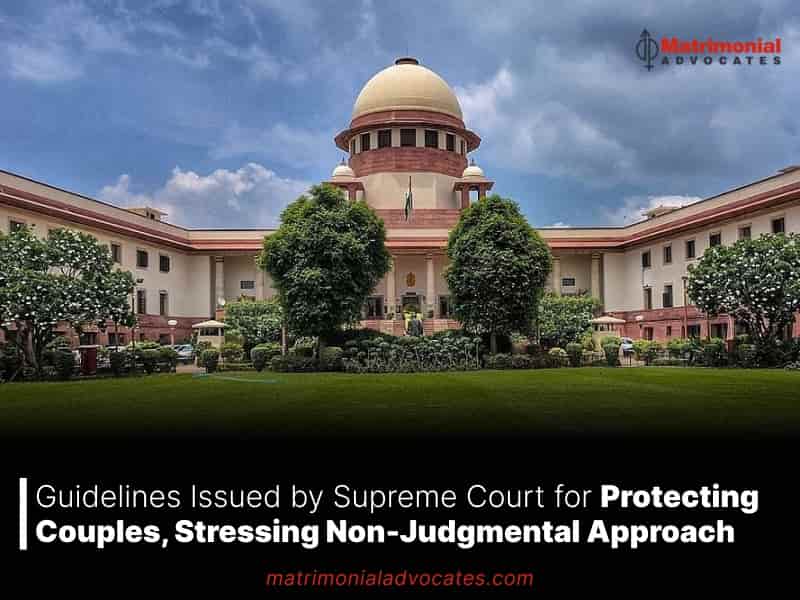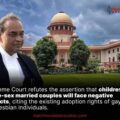
Significantly, the Court said that same-sex, transgender, interfaith or inter-caste couples must be provided immediate protection before they are asked to establish the threats they face.
The Supreme Court of India recently released a comprehensive set of directives for courts handling petitions from couples seeking protection. In a case involving Devu G Nair versus The State of Kerala & Others, the court stressed the importance of refraining from intrusive inquiries into the couples’ relationships. Presided over by Chief Justice of India (CJI) DY Chandrachud, Justice JB Pardiwala, and Justice Manoj Misra, the bench emphasized the obligatory nature of these guidelines, emphasizing their crucial role in upholding the fundamental rights and dignity of intimate partners, including those from the LGBTQ+ community. Additionally, the apex court cautioned against courts passing moral judgments on such couples, emphasizing the necessity of impartiality in adjudication.
“Social morality laden with homophobic or transphobic views or any personal predilection of the judge or sympathy for the natal family must be eschewed. The court must ensure that the law is followed in ascertaining the free will of the detained or missing person,” the top court said.
The Court stressed the imperative of providing immediate protection to couples regardless of sexual orientation, gender identity, or religious and caste backgrounds, without necessitating proof of threats they may face. Furthermore, the Court emphasized the inadmissibility of dismissing a habeas corpus petition solely on the basis of a party’s age. In a significant cautionary stance, the Court warned High Courts against attempting to modify an individual’s identity or sexual orientation through what it described as mere “counselling.” This issue arose in a Habeas Corpus petition concerning the alleged unlawful detention of a lesbian partner by her parents. The Supreme Court was made aware that the Kerala High Court often prescribed counselling in cases involving same-sex couples. Acknowledging that counselling or parental involvement directives could dissuade LGBTQ+ community members, the Court emphasized the importance of establishing clear guidelines for courts handling habeas corpus petitions and those seeking protection from familial or police interference.
“The importance of a chosen family is sometimes lost to the traditional assumption that the natal family is respectful of a person’s choices and freedoms. Courts must not wittingly or unwittingly become allies in this misunderstanding, more so in cases involving habeas corpus petition, petitions for protection of the person, or in missing persons’ complaints,” the top court remarked.
Consequently, the Supreme Court has established the following guidelines:
- Habeas corpus petitions and protection petitions submitted by partners, friends, or relatives should receive priority in court scheduling and hearings. The court must minimize unnecessary adjournments or delays in resolving these matters.
- The court should refrain from scrutinizing the specific nature of the relationship between the petitioner and the individual when determining their legal standing.
- Efforts should be directed towards fostering an environment conducive to open and voluntary dialogue to discern the wishes of the individual in question.
- Ensuring the privacy and safety of the detained or missing person is paramount. This entails conducting in-camera proceedings and providing opportunities for private interaction with the judges in chambers. Recordings of proceedings should be securely stored to prevent unauthorized access.
- The court must prevent undue influence on the detained person’s wishes by the court, law enforcement, or family members. Measures should be implemented to prohibit the presence of individuals purportedly detaining the person against their will during court proceedings.
- During interactions with the detained person, the court should prioritize their comfort and well-being, respecting their chosen name and pronouns, providing basic amenities, and allowing breaks as necessary. Judges should adopt a compassionate approach to alleviate any tension.
- While the court may verify the age of the detained person, minority status should not serve as grounds for dismissing a habeas corpus petition against illegal detention by family members.
- Judges should exhibit empathy, eschewing personal biases or prejudices, and ensure adherence to the law while respecting the detained person’s autonomy.
- If the detained person expresses a desire not to return to their alleged captor or family, immediate release should be granted without delay.
- Acknowledging the societal stigma faced by certain intimate partners, especially those in same-sex, transgender, interfaith, or inter-caste relationships, the court should provide interim police protection before establishing the threshold requirement of significant risk of violence.
- The court should abstain from issuing directives for counseling or parental involvement, instead focusing on discerning the detained person’s wishes.
- Judges must refrain from attempting to influence disclosures of sexual orientation or gender identity and promptly address any discriminatory behavior or remarks during proceedings.
- Sexual orientation and gender identity are personal matters of self-identification, and the court should refrain from passing judgment or making derogatory comments in cases involving LGBTQ+ individuals.





